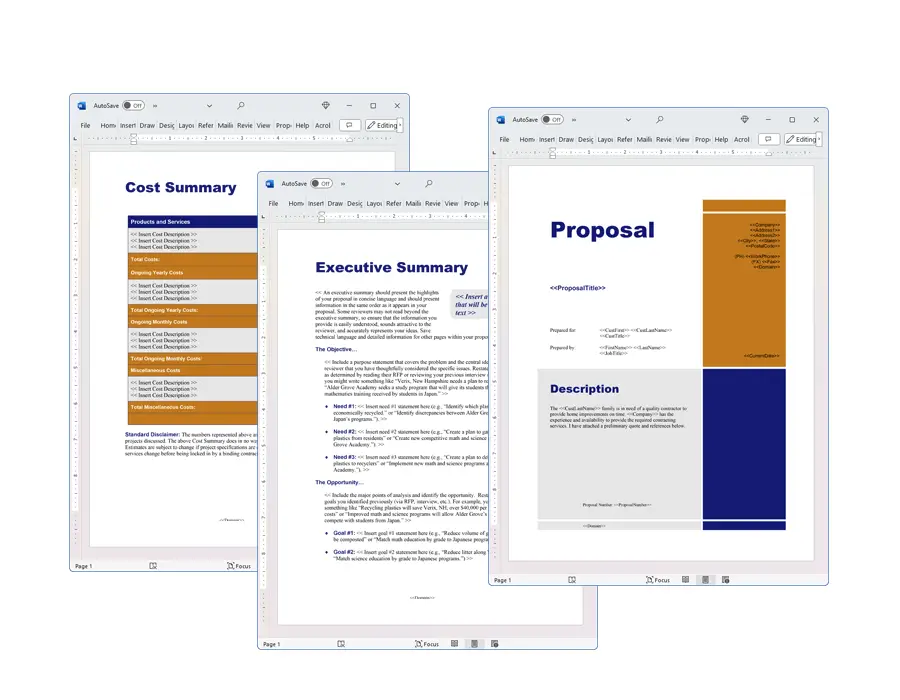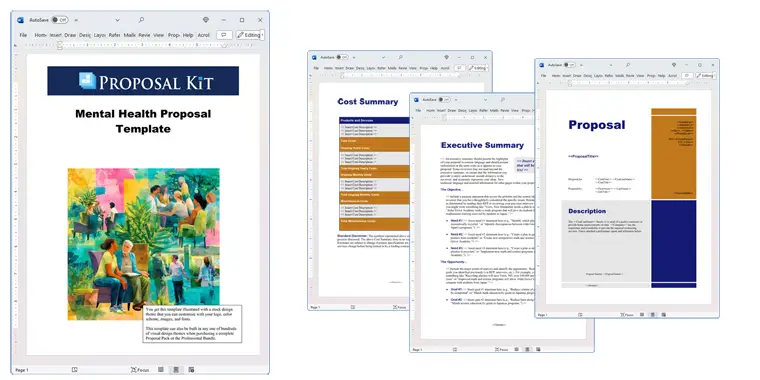How to write your Mental Health Proposal Template
We include this 20 page layout with every Proposal Pack. If you want this template to have a different visual design theme than the one illustrated here, purchase any Proposal Pack design and create this template using the purchased design theme. This template is included in every Proposal Pack. If you get a Proposal Pack or the Professional, you can also make any variation of this template with different chapters to suit your needs.
We typically include more chapters in the templates than most people will need to give everyone more variety in the chapters they may need. You can trim down a long template by removing pages you do not need or combining multiple chapter topics into one page.
 DOWNLOADABLE, ONE-TIME COST, NO SUBSCRIPTION FEES
DOWNLOADABLE, ONE-TIME COST, NO SUBSCRIPTION FEESYou can also create countless variations of this document to suit your needs using the included library of 2200+ chapters if ordering a Proposal Pack or Professional.
 What Our Clients Say
What Our Clients SayProposal Packs are a great way to enhance an already powerful product. It adds a layer of flexibility unmatched by any other software I have found."
DJF Consulting LLC
Related Article
Related Video
Related Templates
- Supplemental Proposal for Additional Funding
- Grant Proposal for Special Needs Support
- Domestic Violence Support Program Funding Proposal
- Mental Health Support for Employees Proposal
- Non-profit Community Healthcare Program Proposal
- Art Therapy Grant Proposal
- Healthcare Grant Proposal
- Healthcare Provider Grant Proposal
- Mental Health Communication and Tracking App Proposal
- Stress Management in Workplace Proposal
- AI For Mental Health Support Proposal Template
What's the best way to write your mental health proposal?
If you are looking for a proven solution to organize and present your mental health business proposal, the Proposal Kit template library and software package are designed specifically for you. By using Proposal Kit, you access a customizable template system that streamlines the entire process of creating a mental wellness service proposal. Not only does it offer expertly written templates for every section you need, but it also includes a line item quoting database system to handle cost summaries, quotes, estimates, budgets, and other financial details. The integrated AI Writer feature helps you create a personalized first write tailored to your exact situation in just minutes, saving you time and boosting your confidence. Additionally, after your proposal is complete, the software can use the AI Writer to automatically create a PowerPoint slideshow - an impressive way to present your ideas to stakeholders.
If you are a mental health service provider, a program director, or a business professional preparing a proposal for investors, partners, or funding bodies, ask yourself: Are you facing the challenge of outlining your services, treatment plans, and capabilities in a clear and professional way? Proposal Kit is designed to give you that edge, empowering you to succeed in your goals.
What Types of Projects Are Mental Health Proposal Written For?
Mental health proposals are required for a wide range of project types within the mental health sector. These situations all benefit from a customized proposal to communicate plans, secure funding, or establish partnerships. Here are some typical examples:
- Launching a new community mental health clinic
- Expanding telehealth mental wellness services
- Starting school-based counseling programs
- Implementing workplace mental health initiatives
- Developing substance abuse treatment plans
- Creating support services for veterans
- Forming crisis intervention teams
- Launching youth mental health awareness campaigns
- Offering outpatient therapy programs
- Establishing residential treatment facilities
- Responding to government or foundation RFPs
- Partnering with hospitals for integrated care
- Providing mental health training for first responders
- Securing grants for suicide prevention initiatives
- Rolling out postpartum mental health support programs
- Creating specialized therapy for trauma survivors
- Building mental health mobile app services
- Launching peer counseling and support groups
- Coordinating collaboration with social services
- Developing targeted programs for minority communities
Chapters this template is built with
There is no single pre-made proposal template that fits every mental health project. Every organization and project is unique. With Proposal Kit, you can build a custom business proposal using thousands of template chapters from the library to address your exact requirements. Below is a sample set of chapter templates you might include in your mental health business plan. Each template is a Microsoft Word format file you can modify and adapt.
Cover Letter
The Cover Letter template is where you formally introduce your organization, explain who you are, and state the reason for submitting your mental health proposal. For example, you can use this chapter to briefly describe your mission - such as providing accessible telehealth counseling for rural communities - and to express your enthusiasm for partnering with the recipient.
Title Page
The Title Page template is used to provide important information at a glance. Here, you can display your project's title (such as "Community Youth Counseling Initiative"), your organization's name, the proposal date, and any relevant logos or graphics. This sets a professional tone and makes it clear who the proposal is from and for.
Table of Contents
With the Table of Contents template, you can outline the sections of your mental health service proposal, making it easier for reviewers to find key areas quickly. For instance, you can list each main section - Needs Assessment, Treatment, Budget, etc. - with corresponding page numbers to streamline the review.
Executive Summary
In the Executive Summary template, you condense your entire project into a few persuasive paragraphs. Here, you can describe the mental health challenge you're addressing, your solution (like expanding school-based therapy services), the projected impact, and the support you're seeking, enabling busy stakeholders to grasp your proposal's value instantly.
Needs Assessment
The Needs Assessment template is your opportunity to present a case for your proposal by outlining the specific mental health needs in the target community. You can use current statistics, survey data, and research findings to illustrate high rates of depression, anxiety, or substance abuse, making your project's importance clear.
Mental Health
Within the Mental Health template, you can explain the particular mental health issues your proposal focuses on - such as trauma, PTSD, or adolescent anxiety. You should clarify the population you serve and the core principles or methods your program uses to address these challenges.
Treatment
The Treatment template lets you detail the therapeutic approaches your organization uses - such as cognitive-behavioral therapy, medication management, or group sessions. You can specify how these methods will be applied, who will administer them, and what outcomes you expect for your clients.
Services Provided
In the Services Provided template, you list and describe every service your organization offers. For a mental health proposal, this might include individual therapy, family counseling, crisis intervention, outreach workshops, and aftercare planning. This gives stakeholders a clear sense of your capabilities.
Evaluation
The Evaluation template is important for describing how you will measure the effectiveness of your program. You might specify performance metrics, such as reductions in hospital admissions or improvements in patient self-report scores, and explain your process for collecting and analyzing this data.
Monitoring
Use the Monitoring template to outline how you will ensure ongoing program quality. You can detail supervision protocols, peer reviews, client feedback mechanisms, and regular audits, demonstrating your commitment to transparency and improvement in your mental health proposal.
Funding Plan
Within the Funding Plan template, you describe your multi-year plan for securing and managing financial resources. You may discuss strategies for grant writing, fundraising campaigns, social enterprise income, or partnerships, showing your long-term sustainability plan.
Funding Request
The Funding Request template is where you state exactly how much funding you are seeking, from whom, and for what purposes. You can break down requests into categories - such as staff salaries, technology, or facility upgrades - and explain how each will support your mental health project's success.
Uses of Funds
In the Uses of Funds template, you can clearly demonstrate how every dollar will be spent. Lay out allocations for therapy supplies, training programs, outreach events, building rent, and administrative costs. This transparency reassures funders and partners of your fiscal responsibility.
Budget
The Budget template provides a detailed financial overview for your proposal. Use this chapter to present a table of expenses and projected revenue for your mental health initiative, including line items for personnel, benefits, equipment, marketing, and indirect costs.
Case Study
With the Case Study template, you can present a real-life example of your organization's positive impact - such as a client who overcame addiction through your program. This narrative helps funders and partners visualize the results your mental health proposal can achieve.
Conclusions
In the Conclusions template, summarize the main points of your proposal, restate your request, and invite further discussion or a meeting. This is your final opportunity to emphasize the urgency and value of your mental health project.
Company History
The Company History template allows you to build trust by sharing your organization's background, key milestones, growth, and previous successes. For example, you might highlight years of service, previous grants received, and awards or accreditations relevant to mental health.
Team Members
With the Team Members template, introduce the experts and staff who will carry out your project. List their qualifications, licenses, specialties (such as child psychologists or social workers), and any relevant experience to demonstrate your team's ability to deliver results.
Appendices
In the Appendices template, attach supplementary materials such as research studies, client testimonials, copies of your licenses, letters of support, or any documentation required by funders. This section can provide all the backup information needed for a thorough review.
Back Page
The Back Page template is for closing statements, organization contact info, legal disclosures, or acknowledgments. You might use it to thank the reader for their consideration, provide the next steps, or list your board of directors and sponsors.
Use cases for this template
Building Trust and Securing Investment for a New Community Clinic
The Challenge
A dedicated program manager at Clear Horizons Health faced the challenging task of establishing a much-needed community mental health clinic in a neighborhood lacking important wellness services. With the pressure to impress local foundations and secure critical funding, she struggled to present the clinic's comprehensive counseling offerings, staffing strategies, and meticulous financial planning in a cohesive and convincing manner. The stakes were high, as multiple projects were competing for the same limited pool of support, and the proposal needed to clearly demonstrate impact and sustainability.
The Solution
She discovered Proposal Kit's robust template library and software platform, which provided a clear pathway to organize her ideas and data. By carefully selecting chapters such as needs assessment, services provided, evaluation, and funding plan, she quickly shaped her mental health clinic proposal into a document that told a full and persuasive story. Each section offered space to detail the unique attributes of the new clinic, highlight community needs, and outline outcome measures, all in a format proven to resonate with funders.
The Implementation
The integrated AI Writer became her secret weapon, enabling her to produce personalized drafts tailored to the clinic's mission and the demographic realities of the neighborhood. By inputting specific project details and allowing the AI to analyze the organization's website, she generated compelling narratives for each chapter. The line item quoting database made assembling a clear and professional budget straightforward, so every dollar requested was justified. She could easily customize tables and charts to fit the foundations' reviewing criteria.
The Outcome
She completed the proposal ahead of her own timeline, giving her team the extra opportunity to review and refine the pitch. Using Proposal Kit's PowerPoint feature, she transformed the finished proposal into a dynamic slideshow, which showcased the clinic's vision, sustainability, and expected impact in a visually engaging format. The board members were impressed not only by the written detail but also by the professional presentation. The result was a successful campaign that earned the needed funding and a surge of enthusiasm throughout the local community.
Meeting Employee Wellness Needs with Unmatched Speed
The Challenge
An HR specialist at TechNova Solutions found himself under pressure to develop an internal proposal for a new workplace mental health initiative. The executive team wanted to see a comprehensive plan - including services, cost estimates, and implementation strategies - within one week. Lacking a background in mental health and feeling pressed for time, he worried about gathering accurate information and presenting it persuasively to company leadership.
The Solution
He turned to the Proposal Kit for support. The software's tailored templates for executive summary, services provided, monitoring, and budget allowed him to piece together a clear and organized proposal. With the help of Proposal Kit's AI Writer, he was able to weave together human resources data, employee feedback, and the company's wellness objectives, creating content that was both relevant and compelling.
The Implementation
By prompting the AI Writer with information about TechNova's culture, workforce demographics, and specific goals for employee well-being, he produced first drafts for every section of his proposal. He fine-tuned the language, inserted specific quotes and prices from the organization's benefits provider using the quoting database, and optimized the formatting for clarity and professionalism. The proposal quickly took shape, saving precious time in the process.
The Outcome
Having finished the proposal a full day before the deadline, he used Proposal Kit's PowerPoint creation tool to deliver a concise and visually appealing slideshow for the executive review. The presentation highlighted key benefits, expected outcomes, and financial details, complementing the written proposal perfectly. The executive team quickly approved the plan, recognizing its professionalism and the urgency of addressing employee mental health, making him a hero in the eyes of his colleagues.
Organizing a Clear RFP for School-Based Counseling Partnerships
The Challenge
A director at HopeBridge was tasked with writing a Request for Proposals (RFP) to attract qualified partners for a new school-based counseling initiative. The project required coordination between educational leaders, parents, social agencies, and potential service providers. She worried about confusing stakeholders with overly technical language or missing key evaluation criteria, potentially leading to poor responses or misunderstandings.
The Solution
She used Proposal Kit's comprehensive template system, focusing on needs assessment, services provided, and evaluation components to ensure every requirement was addressed. The templates helped her logically organize information and emphasized transparency, making it easy for potential partners to understand expectations and respond appropriately.
The Implementation
Employing the AI Writer, she streamlined the process of writing each section, drawing on HopeBridge's mission, the specifics of the school district partnership, and community needs data. Appendices and supporting documentation were quickly assembled using Proposal Kit's extensive library, allowing her to supply additional details without cluttering the main document.
The Outcome
The resulting RFP was both clear and thorough, winning praise from internal and external stakeholders. For the RFP rollout, she used Proposal Kit's PowerPoint feature to create a sharp summary slideshow, which she presented at stakeholder meetings. This visual overview encouraged high engagement clarified the project's aims, and led to a competitive pool of quality responses from interested partners, laying the groundwork for a successful counseling program launch.
Conclusions and Recommendations
Whether you want to launch a new clinic, create an employee wellness program, or manage a school-based counseling project, creating an effective mental health business proposal is vital to winning support and funding. By using Proposal Kit, you tap into a proven system that offers customizable templates, an integrated quoting and budgeting database, and an AI Writer that tailors draft to your unique situation. The PowerPoint conversion feature ensures you can deliver an impactful presentation alongside your written proposal. With Proposal Kit, you confidently address every requirement, communicate your vision clearly, and maximize your chances of success.
Also Known As
This template may also be referred to in different ways or be used in more specialized situations, such as:
- Behavioral Health Proposal
- Counseling Service Proposal
- Mental Wellness Program Plan
- Community Mental Health Project Proposal
- Psychological Services Proposal
- Therapy Services Proposal
- Wellness Initiative Proposal
- Crisis Intervention Proposal
- Substance Abuse Program Proposal
- Employee Assistance Program Proposal
Abstract
 Developing a mental health proposal is crucial as universities, organizations, and community groups recognize the growing need for mental health education, resources, and support services. A well-structured grant proposal must analyze specific needs, present a responsible framework for project implementation, and engage relevant stakeholders such as students, staff, and health professionals. The implementation process should be guided by evidence-based methodology and informed consent, ensuring that individual and group counseling options, stress management programs, and ongoing awareness campaigns are tailored to the environment and specific populations served.
Developing a mental health proposal is crucial as universities, organizations, and community groups recognize the growing need for mental health education, resources, and support services. A well-structured grant proposal must analyze specific needs, present a responsible framework for project implementation, and engage relevant stakeholders such as students, staff, and health professionals. The implementation process should be guided by evidence-based methodology and informed consent, ensuring that individual and group counseling options, stress management programs, and ongoing awareness campaigns are tailored to the environment and specific populations served.
Effective resource allocation is important for meeting the unique requirements of each person, reducing stigma, and creating a supportive and healthier environment. Financial support strategies, including a clear funding plan and budget, demonstrate fiscal responsibility and help secure approval from funders and partners. By outlining project activities, start dates, and continuous improvement guidelines, a mental health proposal promotes transparency and trust. In addition, providing individual and group counseling services, supported by continuous analysis and suggestions for improvement, is crucial for achieving positive outcomes.
A comprehensive proposal should also address legal requirements and ethical considerations, ensuring compliance with the law and best practices. Through careful planning and collaboration, mental health initiatives not only provide vital knowledge and skills but also foster a culture that breaks down barriers of fear and misunderstanding. Ultimately, a well-prepared mental health proposal guides the implementation of programs that address the specific needs of diverse populations, measure impact, and enable continuous progress toward a more supportive community.
 In many cases, mental health proposals are intended to address critical gaps in mental health resources at the university and community levels, where the demand for accessible support has been clearly identified. By providing individual counseling and group counseling services, these projects aim to improve the overall well-being of students, faculty, and vulnerable populations. Creating a detailed grant proposal also enables organizations to secure much-needed financial support, ensuring that mental health programs can be sustainably launched and expanded.
In many cases, mental health proposals are intended to address critical gaps in mental health resources at the university and community levels, where the demand for accessible support has been clearly identified. By providing individual counseling and group counseling services, these projects aim to improve the overall well-being of students, faculty, and vulnerable populations. Creating a detailed grant proposal also enables organizations to secure much-needed financial support, ensuring that mental health programs can be sustainably launched and expanded.
High-quality proposal tools, such as Proposal Kit, streamline the complex process of developing comprehensive documents that communicate project goals, methodologies, and anticipated outcomes. Universities and other institutions benefit from the structured approach these tools offer, making it easier to align project activities with the specific needs of the populations served. By integrating mental health education, resource allocation, and evidence-based interventions, these proposals pave the way for ongoing awareness, reduced stigma, and accessible care.
Well-prepared proposals create opportunities for lasting impact by enabling organizations to provide individual support and important mental health resources where they are needed most.
 When organizations, universities, or community agencies initiate the process of writing a mental health proposal, they are often responding to increasing pressures to create safer, more supportive environments that prioritize well-being. These pressures can come from rising rates of mental health challenges, changing regulations, or feedback from students and staff. A well-designed proposal not only highlights the urgent need for mental health resources and financial support but also demonstrates a commitment to responsible planning, stakeholder collaboration, and legal compliance.
When organizations, universities, or community agencies initiate the process of writing a mental health proposal, they are often responding to increasing pressures to create safer, more supportive environments that prioritize well-being. These pressures can come from rising rates of mental health challenges, changing regulations, or feedback from students and staff. A well-designed proposal not only highlights the urgent need for mental health resources and financial support but also demonstrates a commitment to responsible planning, stakeholder collaboration, and legal compliance.
Proposals play a vital role in setting guidelines for how informed consent will be handled, how data will be collected for analysis and continuous improvement, and how relevant stakeholders will participate in both project implementation and ongoing oversight. The implementation process itself benefits from a clear outline of measurable goals, start dates, and expected outcomes, helping to maintain accountability and ensure that resource allocation matches community expectations. By detailing the roles of each person involved and the framework for providing individual and group counseling, the proposal reassures funders and decision-makers that the organization has a robust plan for addressing both immediate needs and long-term mental health education.
The creation of a comprehensive mental health proposal can empower targeted populations to become more knowledgeable and skilled in stress management and self-advocacy. As stigma and fear are reduced through awareness efforts and consistent project activities, the entire environment becomes more conducive to health, productivity, and academic or professional achievement. Through the careful assembly and approval of these proposals, universities and organizations can ensure legal and ethical standards are respected, resources reach those who most need them, and a culture of continuous improvement is established for future generations.
Frequently Asked Questions
What's the most important information to include in a mental health proposal?
When writing a mental health proposal, it's important to clearly outline the specific mental health needs you are addressing, your proposed solutions or services, and the measurable outcomes you aim to achieve. You should also include a detailed treatment plan, a description of your organization's qualifications, and a realistic budget. This thorough approach helps stakeholders understand your commitment and ability to deliver effective mental health services.
How do I make my mental health proposal stand out to funders or partners?
To make your mental health proposal compelling, tailor your content to the interests of your audience. Highlight the uniqueness of your approach, include evidence-based practices, and share success stories or case studies when possible. Providing clear data, a solid evaluation plan, and demonstrating your team's expertise can help your mental health proposal rise above the competition and capture the attention of decision-makers.
What's the best way to present the budget in a mental health proposal?
A well-organized budget section is critical in any mental health proposal. Break down your costs into clear categories, such as staffing, facilities, materials, and administrative expenses. Clearly explain the necessity of each line item and, if possible, use tables or charts for easy reading. Accuracy and transparency in your budgeting increase trust and credibility with funders reviewing your mental health proposal.
How can I demonstrate the effectiveness of my mental health program in the proposal?
In your mental health proposal, describe the specific methods you'll use to evaluate success - such as surveys, client outcomes, or progress reports. Include past results if available, or reference similar programs with proven effectiveness. Outlining clear metrics and timelines for evaluation reassures funders and partners that their investment in your mental health project will be monitored and yield results.
Are there templates or tools to help me write a mental health proposal more efficiently?
Yes! Using a professional system like Proposal Kit can streamline the entire process of writing your mental health proposal. It provides templates for every section, supports budgeting with quoting tools, and even includes an AI Writer to help generate personalized drafts quickly. These resources help you save time, stay organized, and ensure all critical topics of your mental health proposal are addressed.
20% Off Discount
![]() Add To Cart This Word Template
Add To Cart This Word Template
 Add To Cart Proposal Pack for Any Business
Add To Cart Proposal Pack for Any Business
 Add To Cart Proposal Kit Professional
Add To Cart Proposal Kit Professional
 4.7 stars, based on 849 reviews
4.7 stars, based on 849 reviewsProposal Kit chapters used in this template
Cover Letter, Title Page, Table of Contents, Executive Summary, Needs Assessment, Mental Health, Treatment, Services Provided, Evaluation, Monitoring, Funding Plan, Funding Request, Uses of Funds, Budget, Case Study, Conclusions, Company History, Team Members, Appendices, Back Page
Line Item Automated Chapters
If you purchase a Proposal Pack or the Professional Bundle, these proposal pages are generated using an automated line-item database in the included Wizard software.
Funding Request, Budget Three Year
You use this proposal for
- General business proposal
- Non-technical proposal
- Non-government grant, non-profit, NGO proposal
- Medical, healthcare, wellness proposal
How to create this template with Proposal Pack Wizard
You can create this document using any of the logo-designed Proposal Packs. Pick any Proposal Pack with a logo design theme you like best; they will all work equally well. The Proposal Pack for Any Business is the pack with no extra added logos or colors - designed to be used plain or for you to customize with your logos and graphics.
The Proposal Pack design theme you purchase will determine the visual look of this template. The screenshot above only shows the plain generic design theme.
We include a library of chapters to be assembled based on your needs. All proposals are different and have different needs and goals. We designed Proposal Pack so you can customize the documents to suit your needs.
You will best create this document using the Proposal Pack Wizard - Expert Edition software to select this template and build it in the Proposal Pack logo design theme of your choice along with any desired customizations (such as adding additional chapters, removing unneeded chapters, changing the order of chapters, and importing your company logo). This template outlines a proposal for the described situation. Each user is responsible for typing in the actual content of the provided pages with their information to complete the proposal. Suggestions in the abstract may include features in higher-end packages and are facilitated by the selection of chapter templates to support the narrative of each proposal, which help guide the user in filling in the details.
The Wizard software's AI Writer will write the content of the pages of the template based on details provided for your company, client, project, financial details and other writing instructions. This will provide a personalized version of the template completely written and ready to edit.
Once finished, the AI Writer's Word-to-PowerPoint converter can transform your proposal, business plan, or other business documents into a PowerPoint slideshow. Save time and effort by letting the AI analyze every chapter to condense its content into talking points, visually matching the document, and providing a consistent package of presentation material with the click of a button.
You create this template using the Wizard software with an entire Proposal Pack library and software. We include the Expert Edition of the software in the Proposal Kit Professional. Microsoft Word for Windows is required to use the customizing software. You can also edit Word document templates in other office software such as Word for Mac. We will assist Mac users in assembling complex templates for their first project if they do not have the required platform to run the Wizard software.
How to Build Templates Featured on Proposal Kit Website
Many people find the Proposal Kit website after searching for a specific proposal. Once you've purchased and installed the software, how do you build that template you found in the first place? This video shows you how to build any proposal you see on the Proposal Kit website.
 Ian Lauder has been helping businesses write their proposals and contracts for two decades. Ian is the owner and founder of Proposal Kit, one of the original sources of business proposal and contract software products started in 1997.
Ian Lauder has been helping businesses write their proposals and contracts for two decades. Ian is the owner and founder of Proposal Kit, one of the original sources of business proposal and contract software products started in 1997.By Ian Lauder
 Published by Proposal Kit, Inc.
Published by Proposal Kit, Inc.


 Cart
Cart
 Get 20% off ordering today:
Get 20% off ordering today: 


 Facebook
Facebook YouTube
YouTube Bluesky
Bluesky Search Site
Search Site